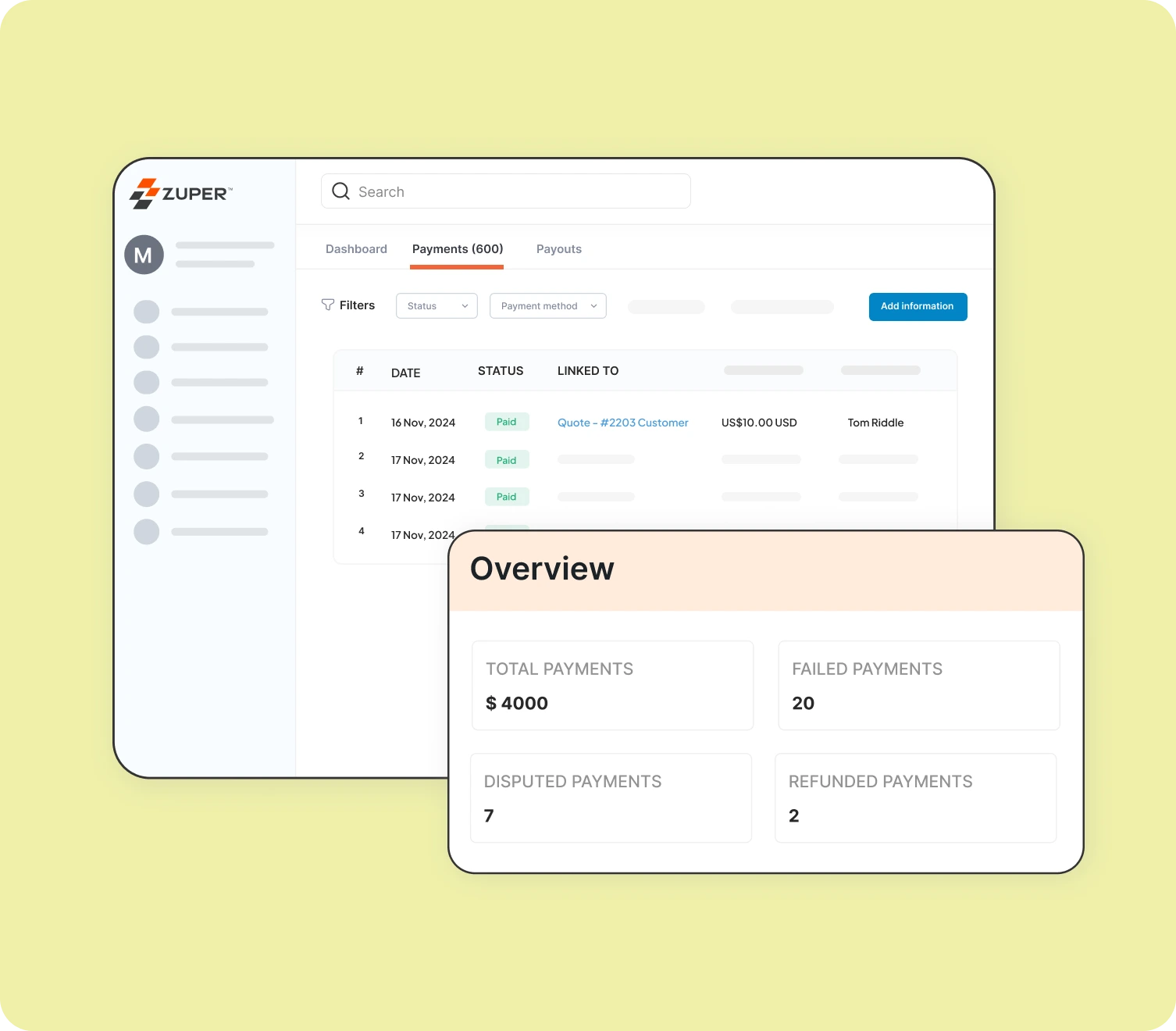All Blogs

AI Roofing Tools
The roofing industry faces a flood of AI-powered platforms promising to revolutionize operations. However, for every tool that delivers real value, several add complexity without solving actual problems. For contractors evaluating AI roofing tools, the question isn’t whether to adopt AI; it’s how to find technology that supports real workflows instead of creating more work. This article examines what makes AI roofing software genuinely useful, focusing on practical applications in estimating, documentation, and coordination that reduce friction for both field crews and office teams. What you’ll learn: How to distinguish workflow-supporting AI from novelty features The specific functions where AI delivers measurable time savings Why integrated systems outperform point solutions How Zuper’s AI capabilities address real roofing pain points The Problem: Feature Overload vs. Workload Support Most contractors don’t need AI that impresses at demos. They need technology that makes Tuesday morning easier. Yet many AI roofing tools prioritize impressive-sounding features over practical utility. Point Solution AI vs. Integrated AI Platform Comparison Metric Point Solution AI Integrated AI Platform Data Entry Time Per Job 35-45 minutes (manual transfer between 5+ systems: measurements → estimating → CRM → scheduling → invoicing) 5-8 minutes (data flows automatically across unified platform; single entry

Comparing the Best AI for Roofing Teams
Roofing contractors are facing a surge of AI-powered software promises, but separating tools that quietly improve execution from those making empty automation claims requires careful evaluation. In January 2026, our research team evaluated AI capabilities across 47 field service management platforms and roofing-specific software solutions to understand what the best AI for roofing actually delivers in practice. We analyzed these platforms using the following weighted factors: Evaluation Factors: Practical Impact (25%) – Does AI improve daily execution or just add complexity? Reliability (20%) – How consistently do AI features work in field conditions? Integration Depth (15%) – Do AI capabilities connect across the entire workflow? Ease of Implementation (15%) – Time to value without extensive training Trust & Transparency (15%) – Clear outputs that teams can verify and act on Innovation Approach (10%) – Automation that supports workers vs. replacing them Based on our algorithm, we rank-ordered platforms by how well their AI capabilities serve roofing contractors in real-world conditions. The table below shows the top performers, with detailed analysis following. Comparing the Best AI for Roofing Rank 1 2 3 4 5 6 Platform Zuper JobNimbus EagleView Assess CompanyCam Roofr SumoQuote Avg Review Score 4.8/5.0 4.3/5.0 4.5/5.0 4.7/5.0 4.2/5.0

AI Roofing Estimating Calculator Software
Roofing estimates can make or break project margins. A 5% labor underestimate on a $20,000 job costs you $1,000 straight from your profit. With material costs climbing and crew availability tightening, traditional estimating methods leave too much room for costly errors. An AI roofing estimating calculator changes that equation by learning from real project data to deliver faster, more accurate quotes with fewer mid-job adjustments. Manual estimating processes built for yesterday’s market cannot keep pace with today’s volatile costs and complex projects. When your team relies on static templates and outdated pricing sheets, you risk underbidding labor or missing waste factors that force expensive mid-project resupply runs. In this guide, you’ll learn: How AI-powered calculators reduce estimating time while improving accuracy Which data inputs drive smarter predictions and fewer change orders Specific features that separate basic templates from intelligent estimation Real operational benefits roofing teams gain from AI-assisted workflows How an AI Roofing Estimating Calculator Improves Accuracy Traditional estimating relies on fixed formulas and historical averages. An AI roofing estimating calculator operates differently. These systems analyze patterns across completed projects, such as material usage, labor hours, weather delays, and regional cost fluctuations, to generate estimates that reflect current market conditions

Q&A: Driving Service Excellence — Allison Heaney, President of Skaggs-Walsh
In this interview, we speak with Allison Heaney, President and Owner of Skaggs-Walsh—the top-rated family-owned home comfort provider in the New York area with over 90 years of expertise—about operations, technology & what field service tools like Zuper bring to the table. Q: Allison, thank you for joining us. To start, tell us a bit about Skaggs-Walsh and your role as President. Allison Heaney: Thank you, it’s great to be here. Skaggs-Walsh is a family-owned service company with a history of over 90 years. We provide comprehensive home comfort services, from heating oil delivery and HVAC maintenance to plumbing and electrical support, across the New York metro area. I’ve been proud to take up leadership as President, continuing the legacy of quality and trust built by my father and grandfather. A core part of what we do is ensuring people’s homes are safe, comfortable, and efficient. Q: In an industry like home services, what does delivering “service excellence” really mean? Allison Heaney: It’s about reliability, transparency, and responsiveness. When a customer calls about a heating issue in the middle of winter or a plumbing emergency, they want a solution, and they want it fast. Over the decades, we’ve learned that

Best All-In-One Roofing CRM Software
Compare the best all-in-one roofing CRM software. See rankings, reviews, and what separates true unified platforms from disconnected tools.

Best Roofing CRM 2026
In December 2025, our research team analyzed 52 roofing CRM platforms serving contractors across North America. We evaluated each platform using the following weighted criteria: AI & Automation Capabilities (25%) — Native AI features, workflow automation, hands-free documentation System Integration (20%) — All-in-one functionality vs. fragmented tools, consolidation value Field Mobility (15%) — Mobile app functionality, offline capabilities, field team adoption Customer Communication (15%) — Built-in texting, email, portal, automated messaging Financial Management (10%) — Invoicing, payment processing, QuickBooks integration, job costing Implementation Speed (10%) — Onboarding time, training requirements, time to value Specialty (5%) — Primary differentiator Using this algorithm, we rank-ordered platforms based on their ability to answer the critical question roofing contractors face daily: “Where do my customer and project records live?” In 2026, the best roofing CRM is the one that unifies inspections, estimates, projects, and customer data in a single, intelligent system. The table below displays the top performers, accompanied by detailed reviews. Best Roofing CRM Platforms of 2026 Rank Platform AI Automation Score Integration Score Starting Price Implementation Time Mobile Rating Native Integrations Training Hours Ideal Team Size Speciality 1 Zuper 9.6/10 9.5/10 Custom quote 4 weeks 4.6★ 60+ platforms 12-16 hours 10-500+ users

Best Roofing Software
When roofing crews face changing weather, material delays, or last-minute inspections, the best roofing software doesn’t just look good in a demo; it keeps projects moving through chaos. For companies managing multiple roofing projects simultaneously, choosing software comes down to one question: how well does this software help me run roofing jobs when conditions change? Our evaluation criteria: We assessed platforms based on five critical factors for multi-project coordination: (1) real-time field-to-office synchronization capability, (2) offline mobile functionality that maintains productivity without connectivity, (3) multi-project management tools including dependencies and task tracking, (4) automation features that reduce administrative burden, and (5) verified customer ratings from G2 and Capterra reflecting real-world performance during active jobs. Comparing the Best Roofing Software: Features That Matter for Active Jobs Rank Software Avg Review Score Real-Time Sync Offline Mode Multi-Project Mgmt AI Features Implementation Integrations Customer Portal Pricing Best For 1 Zuper 4.7 Instant bi-directional Full offline with auto-sync Kanban, Gantt, dependencies AI Responder, call summaries, voice notes 3 months 60+ (QuickBooks, HubSpot, Sage) Self-service with payments Per-user subscription 3+ concurrent projects 2 AccuLynx 4.5 Real-time with delays Limited offline Milestone workflows None 2-4 months ABC Supply, SRS, QXO Limited access Custom quote Material cost

Best Estimating Roofing Software
In December 2025, our research team analyzed the roofing estimating software landscape in the United States. We evaluated 58 platforms using the following weighted factors: Estimating Accuracy & Integration (30%): How precisely the software calculates material costs, labor rates, and project scope, plus how seamlessly estimates connect to CRM and project workflows CRM & Workflow Connectivity (25%): The platform’s ability to sync estimates directly into customer relationship management and project execution systems Change Order Management (15%): Tools for tracking scope changes, managing revisions, and protecting profit margins during project modifications Mobile Capabilities & Field Access (15%): On-site estimating features, offline functionality, and real-time data synchronization Financial Controls & Reporting (15%): Job profitability tracking, margin analysis, and cost variance monitoring After analyzing these platforms based on our algorithm, we rank-ordered the best estimating roofing software and present the top performers in the table below, followed by in-depth reviews of each solution. The Best Estimating Roofing Software Rank 1 2 3 4 5 6 Software Zuper AccuLynx JobNimbus RoofSnap Roofr EagleView Starting Price Custom Custom Custom $13/ measurement Free $33/report Native Integrations 60+ 50+ 40+ 15+ 25+ 30+ Avg. Implementation Time 2-4 weeks 8-12 weeks 3-6 weeks 1-2 weeks 1-3 weeks N/A

Zuper Vs Jobber: Comparison 2026
Choosing the right field service management (FSM) software can significantly impact the efficiency of your operation. If you’re comparing Zuper vs Jobber, you’re looking at two popular platforms with different strengths. This comprehensive guide examines both solutions to help you determine which one best fits your service business needs. Both Zuper and Jobber aim to streamline field operations, but they take different approaches. Zuper positions itself as an intelligent, highly customizable FSM solution ideal for businesses with complex workflows, while Jobber markets itself as an easy-to-use platform perfect for small to mid-sized home service businesses. Understanding the key differences in the Zuper vs Jobber debate requires examining features, pricing, user experiences, and scalability. Quick Comparison: Zuper vs Jobber at a Glance Feature Zuper Jobber Overall Rating 4.7/5 (G2) 4.6/5 (G2) Best For Growing businesses with complex needs Small home service businesses Starting Price ~$55/user/month $28/user/month (annual) Inventory Management ✔ Full suite ✘ Not included Live GPS Tracking ✔ Yes ✘ No Offline Mobile Access ✔ Yes ✘ No Project Management Advanced Basic Ease of Use Moderate learning curve Very intuitive Ideal team size 10+ users 1-15 users What Sets Zuper and Jobber Apart? When evaluating Zuper vs Jobber, several critical

Zuper Vs ServiceTitan: Comparison 2026
From October through November 2025, our research team evaluated field service management software platforms serving the roofing industry. We analyzed the two leading contenders, Zuper and ServiceTitan, using the following weighted factors: G2 Rating (25%): Customer satisfaction score from verified users Ease of Implementation (20%): Time to onboarding and setup complexity Core Feature Set (20%): Work order management, scheduling, and mobile capabilities Cost Structure (15%): Pricing transparency and total cost of ownership Customer Support Quality (10%): Response times and issue resolution Platform Innovation (10%): AI features, automation, and development velocity After applying this algorithm to our dataset, we rank-ordered the platforms based on their fit for roofing contractors. The table below compares Zuper vs ServiceTitan, illustrating how each solution performs across these critical dimensions, with a detailed analysis provided in the following section. Zuper vs ServiceTitan Comparison Table Factor 1. Zuper 2. ServiceTitan G2 Rating 4.7/5.0 4.5/5.0 Implementation Time 4 weeks 3-6 months Roofing-Specific Features High Moderate Starting Price Contact Vendor Contact Vendor Customer Support Excellent Mixed Zuper, for Roofing Operations Automation Zuper positions itself as a unified field service management platform built to replace multiple point solutions. The software targets roofing contractors seeking automation, mobile-first workflows, and rapid deployment.

Roofing Safety: Fall Protection Guide
Every 99 minutes, a worker dies from a work-related injury in the United States. For roofing contractors, the statistics are sobering: 82% of workplace fatalities are caused by falls. As the third deadliest civilian occupation in America, roofing safety isn’t just about compliance; it’s about protecting lives and building sustainable businesses. Modern roofing safety practices combine proven protective equipment with innovative technology to keep crews safer while improving efficiency. This guide examines essential safety elements that every roofing company should implement, including cutting-edge hands-free solutions that transform the way contractors work at heights. In this article, you’ll discover: Core roofing safety equipment and OSHA requirements What roofers use for safety on different project types How hands-free technology like smart glasses enhances crew protection Best practices for comprehensive safety programs Understanding the Stakes The roofing industry has a fatality rate of 51.8 per 100,000 full-time workers, which is ten times higher than that of other construction trades. According to OSHA, falls from roofs accounted for 34% of construction fall deaths between 2003 and 2013. The consequences extend beyond tragedy. Workplace injuries increase insurance costs, delay projects, and erode client trust. A single incident can devastate a roofing business financially and damage

It’s Roofing Slow Season: How to Stay Profitable
Every roofing contractor knows the feeling. After months of back-to-back jobs and fully booked schedules, demand suddenly drops off a cliff. The phone stops ringing as frequently, estimates slow to a trickle, and your crew finds themselves with unexpected downtime. This is the roofing slow season. The predictable lull that hits the industry when weather conditions make full roof installations impractical or unsafe. While many contractors view this period as something to simply endure, the smartest operators recognize it as the perfect opportunity to strengthen their business foundation and position themselves for explosive growth when demand returns. The key lies in leveraging three critical business assets that many contractors overlook: your existing sales pipeline, maintenance service packages, and the valuable customer data sitting in your CRM system. This guide offers advice for: Understanding when the slow season hits your specific region Maximizing revenue from maintenance packages and service agreements Working your existing customer database for growth opportunities Leveraging CRM data to identify sales pipeline optimization strategies Building systems that keep revenue flowing year-round When Roofing Slow Seasons Strike Across the United States Region Primary Slow Period Top Challenges Alternative Services Northeast December – March Snow, ice, and freezing temperatures Emergency

Roofing License Requirements by State: Updated 2025
Operating a roofing business requires more than skilled craftsmanship and quality materials. In most U.S. states, you must hold a valid roofing license to legally undertake projects, and understanding these requirements is the first step in building a compliant and profitable operation. With requirements varying dramatically from state to state, roofing contractors must navigate a complex landscape of exams, experience thresholds, insurance mandates, and renewal obligations. This guide breaks down roofing license requirements by state across all 50 states, helping you understand where you need credentials, what it takes to earn them, and how field service management software can simplify compliance tracking as your business grows. What You’ll Learn Which states require roofing licenses, and which do not Common licensing requirements, including exams, experience, and bonding Specific licensing thresholds and classifications by state How to maintain and renew your roofing credentials Digital tools that help manage compliance across multiple jurisdictions Roofing License Requirements by State The licensing landscape varies significantly across the United States. Some states enforce strict licensing with mandatory exams and years of documented experience, while others require only basic registration or no state-level credentials at all. License Status States Key Requirements License Required Alaska, California, Florida, Hawaii,

Best Roofing Contractor Software
Between April and October 2025, our research team analyzed leading roofing contractor software platforms serving businesses across North America. We evaluated 8 platforms using the following weighted criteria: All-in-One Functionality (25%) – Does it handle leads, estimates, scheduling, invoicing, and payments in one system? AI & Automation Features (20%) – What intelligent capabilities reduce manual work? Mobile Accessibility (15%) – Can field teams access full functionality offline and on mobile devices? Customer Review Score (15%) – Average rating across G2, Capterra, and Software Advice Integration Ecosystem (10%) – Does it connect with QuickBooks, measurement tools, and other essential apps? Ease of Use (10%) – How quickly can teams get up and running? Specialty (5%) – Roofing-specific vs. general field service focus Based on our algorithm, we ranked the best roofing contractor software and present the top performers below, with detailed qualitative reviews to help you choose the right fit. The Best Roofing Contractor Software in 2025 In the table below, we break down how each platform measures up across the key factors that matter most to roofing contractors: Software All-in-One Functionality AI Features Mobile Access Avg. Review Score Integration Ecosystem Specialty 1 Zuper Comprehensive Advanced AI-native Offline-capable iOS/Android app 4.6/5.0

How to Bid a Roofing Job: Contractors’ Pricing Guide
Bidding a roofing job incorrectly can cost you thousands of dollars. It has been estimated that 90 percent of roofers underbid their jobs, leaving profit on the table, or worse, losing money on completed work. Whether you run a small crew or manage multiple teams, learning to bid for roofing jobs with precision protects your bottom line and helps you grow a sustainable business. This guide walks you through the essential steps of how to bid a roofing job, allowing you to stay competitive while maintaining healthy margins. In this article: How to measure and calculate materials accurately Breaking down labor costs by crew size and roof complexity Understanding overhead and hidden costs Setting profitable pricing without overcharging Presenting professional proposals that close deals How to Bid a Roofing Job Essential Bidding Components at a Glance Before diving into calculations, it is essential to understand the four pillars of every roofing bid. This table breaks down the typical cost ranges for a standard 2,500-square-foot residential roof replacement. Component Cost Range Typical % of Total Key Variables Materials $5,500-$9,000 40-50% Shingle type, underlayment, flashing, ventilation Labor $3,000-$5,500 25-35% Crew size, roof pitch, complexity, layers Overhead $1,500-$2,500 10-15% Insurance, fuel, equipment, office

Lead Generation for Roofers: How to Fill Your Pipeline
Finding quality roofing leads is the foundation of every successful roofing business. With over 99,000 roofing companies competing for homeowner attention across North America, effective lead generation for roofing separates thriving businesses from those struggling to fill their pipeline. This guide explores proven multi-channel strategies that combine traditional marketing with modern technology to attract, convert, and manage leads at scale. Whether you’re wondering if buying roofing leads works, how much roofing companies typically pay for leads, or seeking actionable strategies to generate leads organically, this comprehensive breakdown of lead generation for roofers provides the roadmap to sustainable growth. Lead Generation Strategy Overview Channel Avg Cost Per Lead Conversion Rate Best For Implementation Difficulty SEO/Content Marketing $25-$50 15-25% Long-term growth High Google Ads $50-$150 8-15% Immediate results Medium Facebook Ads $100-$200 5-12% Brand awareness Medium Direct Mail $30-$80 12-20% Local targeting Low Referrals $0-$25 25-40% Quality leads Medium Lead Services $50-$300 5-20% Quick scaling Low The Multi-Channel Lead Generation Framework Search Engine Optimization (SEO) SEO remains the most sustainable channel for generating leads among roofing contractors. Homeowners searching for “roofing contractors near me” or “roof repair [city]” represent high-intent prospects actively seeking services¹. Essential SEO strategies include: Creating location-specific service pages

How to Get Roofing Leads from Insurance Companies
When a major storm or natural disaster happens in your service area, massive storm damage will occur in people’s homes, and they will contact their insurance agent to file an insurance claim. The insurance agent will dispatch an adjuster who will arrive with a roofing professional and assess the damage.

Asset Management in Field Service: Explained
Every field service job depends on having the right assets in the right place at the right time, whether it’s specialized HVAC diagnostic tools, roofing safety equipment, plumbing inspection cameras, or electrical testing devices. Successful service delivery hinges on effective asset management. In this guide to asset management in field service, we’ll examine how asset management works across service industries, why fragmented systems create costly inefficiencies, and how unified platforms can transform your field operations. What you’ll discover: Why asset management challenges vary across service industries How unplanned downtime costs companies up to $260,000 per hour1 The critical differences between customer-owned and company-owned asset tracking How all-in-one platforms eliminate asset management chaos Asset Management Challenges Across Service Industries Field service companies face unique asset management challenges that vary significantly across industries. Understanding these differences is crucial for implementing effective solutions. Industry Primary Assets Key Challenges Average Downtime Cost HVAC Diagnostic tools, refrigerant equipment, and HVAC units Temperature-sensitive parts, seasonal demand spikes $125,000/hour2 Roofing Safety equipment, material hoists, and inspection tools Weather-dependent work, high-value materials $85,000/hour3 Plumbing Pipe inspection cameras, leak detectors, specialty tools Emergency response requirements, sanitation concerns $95,000/hour4 Electrical Testing equipment, meters, safety gear Safety compliance, precision instruments $110,000/hour5

Best Accounting Software for Roofing Companies 2026
In October 2025, our research team analyzed 47 accounting solutions specifically designed for roofing contractors and field service businesses. We evaluated these platforms using the following weighted comparison factors: Integration Abilities (25%) – How well the software connects with existing business tools and systems Average Customer Ratings (20%) – Real user satisfaction scores across multiple review platforms Roofing-Specific Features (20%) – Job costing, project management, and industry-specific tools Financial Management Capabilities (15%) – Invoicing, payment processing, and financial reporting Ease of Use (10%) – User interface design and learning curve for roofing teams Mobile Functionality (10%) – Field access and mobile workforce management Based on our algorithm, we rank-ordered platforms by their overall performance across these categories. The table below presents the top accounting software options for roofing companies, along with detailed reviews for each entry. The Best Accounting Software for Roofing Companies in 2026 Platform Integration Abilities Avg. Customer Ratings Roofing-Specific Features Financial Management Mobile Functionality Specialty 1 Zuper Excellent 4.5/5.0 Excellent Excellent Excellent All-in-one roofing management platform 2 QuickBooks Online Excellent 4.4/5.0 Fair Excellent Good General accounting 3 AccuLynx Good 4.4/5.0 Excellent Good Good Roofing operations 4 Sage 100 Contractor Good 4.2/5.0 Good Excellent Fair Construction accounting 5

Roofing Industry Trends 2026
The roofing industry is undergoing an unprecedented transformation as it enters 2026. From AI-powered field management to sustainable materials that meet evolving climate challenges, roofing contractors face both opportunities and operational complexities that require strategic adaptation. Whether you’re managing growing project volumes, navigating labor shortages, or meeting increasing demands for energy-efficient solutions, understanding these trends will determine your competitive position in a rapidly evolving market. Here are the key roofing industry trends for 2026: Market expansion driven by aging infrastructure and climate demands Technology integration is revolutionizing operations and customer experience Sustainability requirements becoming standard, not optional Labor solutions based on increased automation and enhanced training programs Advanced materials offering superior performance and longevity Roofing Industry Trends for 2026 Roofing Market Growth Accelerates Despite Challenges The global roofing market is projected to reach USD 130 billion by 2033, growing at a CAGR of 3.3% from 2026¹. This growth reflects several converging factors: aging housing stock built during the 2000s boom reaching replacement cycles, increased storm frequency requiring repairs, and new construction demands. Roofing Industry Market Trends for 2026 Market Segment 2026 Value Growth Rate Key Drivers Global Roofing Market $132.5 billion 3.3% CAGR Aging Commercial Roofing Materials $14.2 billion 6.1%

Service Scheduling Software to Streamline Your Business Operations
Running a service-based business can be challenging, especially when managing appointments, coordinating staff, and keeping customers satisfied.
Learn More About
Zuper Today
Schedule a demo with our product experts and explore how you can improve your field service operations today.